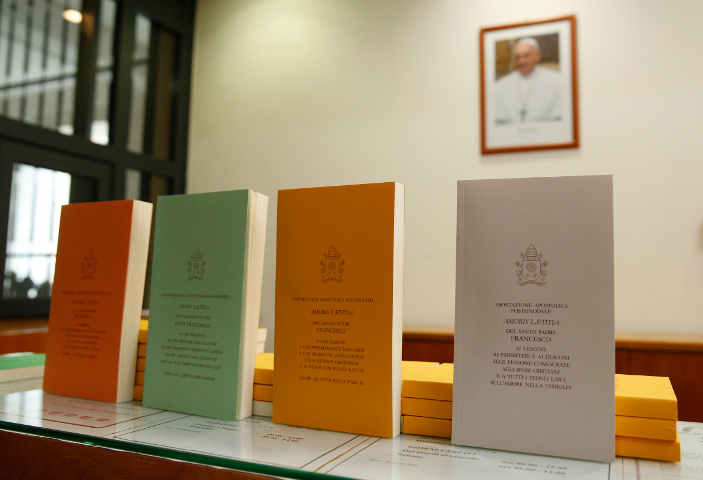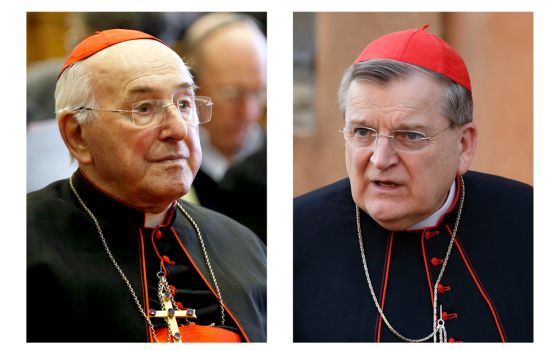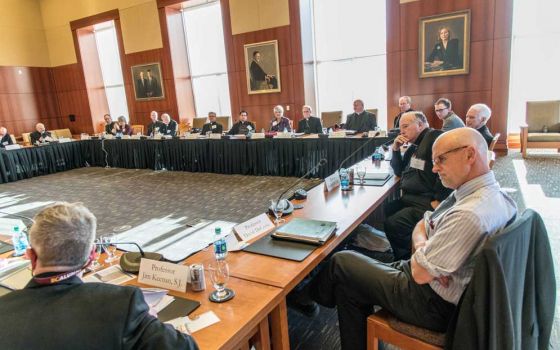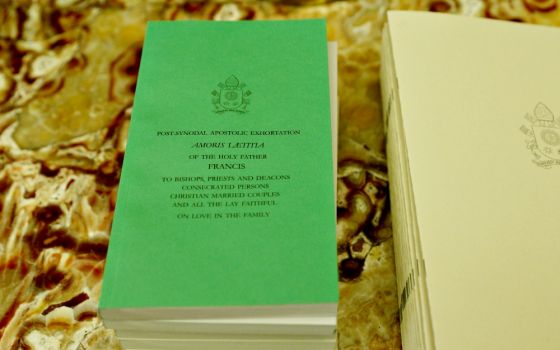
Copies of Pope Francis' apostolic exhortation "Amoris Laetitia" ("The Joy of Love") at the document's release at the Vatican April 8, 2016. (CNS/Paul Haring)
So the news the traditionalist blog Rorate Caeli had proclaimed Aug. 19 as “unbelievable” turned out to be anything but. Not even the “formal correction” of Cardinal Raymond Burke, but a lesser “filial correction” by a tiny minority with heavy leanings towards the Society of St. Pius X.
I'm talking about a 25-page letter issued Sept. 24, in which a few dozen Catholics say Pope Francis has committed heresy, pointing to the teachings on family life he offered in his 2016 apostolic exhortation Amoris Laetitia ("The Joy of Love").
It is difficult to know where to start on this one: the hypocrisy or the risible accusations of heresy against the Holy Father. I’ll go with hypocrisy.
The most glaring — and comically ironic, considering the famous footnote 351 of Amoris Laetitia — is the deliberate omission in footnote 21 of the signatories’ letter of a crucial quote from Pastor Aeternus, the First Vatican Council’s Dogmatic Constitution on the Church.
The letter writers directly quote either side of the passage but omit this portion: “Indeed, their apostolic teaching was embraced by all the venerable fathers and reverenced and followed by all the holy orthodox doctors, for they knew very well that this See of St. Peter always remains unblemished by any error, in accordance with the divine promise of our Lord and Savior.”
Now the question must be asked: why did they omit that? Simply because to have included it would have destroyed in one stroke their entire premise of heresy against the pope. It beggars belief they thought nobody would notice. Can they seriously accuse the pope of “omissions” after that?
But of course Pastor Aeternus was only repeating what Pope Innocent III had proclaimed in his apostolic letter Sedis Primatus: “The Lord clearly intimates that Peter’s successors will never at any time deviate from the Catholic faith, but will instead recall the others and strengthen the hesitant.”
This cynical attempt at forcing the hand of the pope ... comes from a group that does not really trust in the Holy Spirit.
The hesitant, in this case, are these dissenters. They say they adhere to the doctrine of papal infallibility, yet are happy to reject the teaching of a variety of popes concerning the authority of the non-infallible ordinary magisterium.
We can recall St. John Paul II’s teaching on the Holy Spirit’s “charism of special assistance” that protects popes from erring in matters of faith and morals for the “whole exercise of the magisterium.”
How about Blessed Pius IX, who in 1846 stated “this authority judges infallibly all disputes which concern matters of faith and morals,” or Pius XII who said in Humani Generis that the papal magisterium “in matters of faith and morals must be the proximate and universal criterion of truth for all theologians.”
Pius XII added: “Nor must it be thought that what is expounded in Encyclical Letters does not of itself demand consent, since in writing such Letters the Popes do not exercise the supreme power of their Teaching Authority. For these matters are taught with the ordinary teaching authority, of which it is true to say: ‘He who heareth you, heareth me.’”
So I ask the signatories, does he who hears Pope Francis also hear Jesus?
Or to rephrase the question: why are these signatories — and the dubia cardinals for that matter — rejecting the clear teaching that not only are popes protected from error in faith and morals (regardless of it being defined infallibly proclaimed or not) but that all acts of the magisterium derive from Christ (see Donum Veritatis)?
The hypocrisy continues. They accuse Pope Francis of being influenced by Martin Luther, and yet their very rejection of the ordinary papal magisterium in its totality — thus picking and choosing what to accept through their own “wisdom” and “authority”— is nothing else but naked Protestantism. Again, the irony is there for all to see; this coming from the defenders of the faith!
Another glaring piece of sheer hypocrisy comes in the form of their statement that they don’t seek to judge the guilt of Pope Francis in his upholding “directly or indirectly … the false and heretical propositions.” And yet, do they do the same for people in irregular unions? No. For them it is unrepentant adultery and they are all mortal sinners.
Accusations based on a fantasy
If we turn to the actual accusations levelled at Pope Francis, there is one damning element noticeable immediately: Not one of them contains any quote from Amoris Laetitia. All seven are based on a fantasy, as if the signatories have collectively dreamt up some parallel text.
Essentially though, it is lies, and in all honesty, disgraceful. One wonders if there is genuine desire to seek the truth contained in this magisterial document, when theologians and scholars cannot fail to notice what are obvious rejections of the heresies the letter writers purport to see.
Take for instance their first claim, which is based on the Council of Trent’s teaching that God always gives the necessary grace to keep the commandments; a fact they think the pope denies.
If they actually read Amoris Laetitia carefully, they would read this: “For the law is itself a gift of God which points out the way, a gift for everyone without exception; it can be followed with the help of grace” (AL 295). No heresy or denial of Trent there then. Let’s also bear in mind at this point in the text the pope is promoting John Paul II’s “law of gradualness.”
The second and third accusations are basically the same. They are insinuating the pope has changed the teaching on what constitutes mortal sin. Yet nowhere in Amoris Laetitia does the Holy Father suggest anything of the sort. He talks of mitigating factors that may reduce culpability (301-302); almost certainly in the area of full consent of will.
In paragraph 297, he clearly warns those flaunting their state of objective grave sin. I invite the signatories to read what the church teaches about subjective culpability. The Congregation for the Doctrine of the Faith stated it was applicable to “every moral disorder, even if intrinsic.”
It is almost an insult to the Holy Father to even give space to the fourth and fifth accusations: a person sins against God by obeying a divine prohibition, and conscience can judge that sometimes committing intrinsically evil acts is a good option or even commanded by God.
Two things I would say here: 1) to the signatories, if you are going to make such ridiculous claims, back it up with some quotes for the rest of us to see; 2) Pope Francis frames Chapter 8 of Amoris Laetitia and the irregular situations always in the light of the sin that is present if those acts take place, but considers the mitigating circumstances.
His teaching is designed to say to these souls “with God’s grace you can move forward on a new path as long as recognition of the sinful state is there, and secondly a desire to change it is present, even if circumstances may make that extremely difficult.”
Advertisement
Accusation six is simply trying to drive a wedge between Amoris Laetitia and John Paul II’s 1993 encyclical Veritatis Splendor. It fails completely for the reasons I have already given. Pope Francis at no stage allows for exceptions to the moral truth that gravely sinful acts are and will always remain sinful. Again the signatories couldn’t actually find any quote from Amoris Laetitia to back up the absurdity.
However, I believe it is appropriate at this point to remind the signatories what Pope Benedict XVI said about male prostitutes using condoms. He saw it as a possible first step towards a change even if the objective grave sin remains. That could be seen as the “law of gradualness” in motion. Pope Francis seems to share this vision of the light of grace that can patiently lead a soul out of the wilderness of sin.
The last of the accusations presented is similar to several earlier ones in the claim that Holy Communion can be given to those who don’t express contrition for their situation and a firm purpose of amendment.
I would just again refer to the pope’s words about those who flaunt their state: “he or she can in no way presume to teach or preach to others; this is a case of something which separates from the community (cf. Matt 18:17). Such a person needs to listen once more to the Gospel message and its call to conversion.”
Sadly, it seems the signatories didn’t read that section of the text. What can be said without hesitation is that, as Donum Veritatis teaches, “magisterial decisions in matters of discipline, even if they are not guaranteed by the charism of infallibility, are not without divine assistance and call for the adherence of the faithful.”
Pope Francis shares Pope Benedict's vision of the light of grace patiently leading a soul out of the wilderness of sin.
So the question the signatories must answer is: do you believe and adhere to that and if not why not?
We can see that this cynical attempt at forcing the hand of the pope is nothing more than a charade. It comes from a group that does not really trust in the Holy Spirit’s desire or ability to guide and protect the church.
In the light of this sorry episode and the continual angst showed by so many traditionalists on social media, I believe there is a need for the traditionalist movement to do some serious soul searching. If they think this is the way to please the Lord, then they don’t know the Lord.
I will end with one final warning about how hypocrisy can come back to bite you. In 2012, during Benedict’s pontificate, Rorate Caeli posted a large quote from St. Pius X intended to instruct all readers to obey the pope. The headline ran: “Love the Pope! — no ifs, and no buts.”
This is part of the quote. I am sure readers will need no further explanation:
“Therefore, when we love the Pope, there are no discussions regarding what he orders or demands, or up to what point obedience must go, and in what things he is to be obeyed … we do not limit the field in which he might and must exercise his authority; we do not set above the authority of the Pope that of other persons, however learned, who dissent from the Pope, who, even though learned, are not holy, because whoever is holy cannot dissent from the Pope.”
[Stephen Walford is a British Catholic author. Educated at Bristol University, he is the author of two books: Heralds of the Second Coming: Our Lady, the Divine Mercy, and the Popes of the Marian Era from Blessed Pius IX to Benedict XVI (Angelico Press), and Communion of Saints: The Unity of Divine Love in the Mystical Body of Christ (Angelico Press). He is currently working on a book concerning Amoris Laetitia.]






